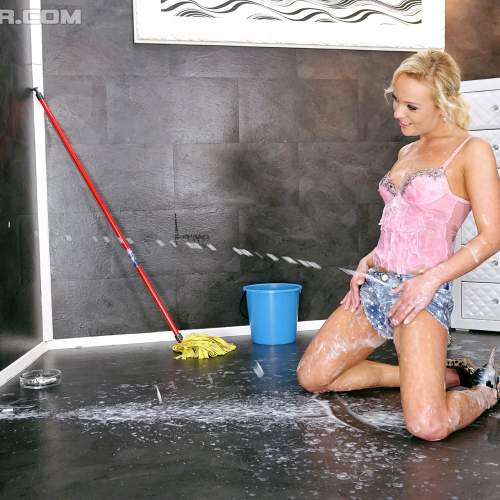|
|
|||
| forums: groups: | |||
|
"Looking for new messy games to play"
Hi, I've been practising some messy games with other partner, but it's becaming repetitive. I'm looking for new messy games to play in couple. It could be in private, or public places, and with domination or submission, we're open minded. Can you help me and refresh my ideas?
Thank you very much !
Thank you very much !
Both sit opposite each other blindfolded and throw pies at each other.
One partner has their hands cuffed behind them, and has to crawl about the floor (which might have a few pies left on it) and pull over buckets of gunge or headdunk) to find the keys to release.
[modified from the drinking game Arrogance]
Place a bucket between you two. Add any amount of gunge/slop/mess to the bucket- savoury, sweet, nasty, or nice; this game works best with a selection to choose from.
Toss a coin, if its heads you pass the bucket to your partner who adds more mess and tosses again.
If its tails, you partner decides on how you end up wearing the contents of the bucket.
[A dice also works well- allows you to really fill the bucket up]
I guess you can also do something similar with the Ring of Fire drinking game, where each card is a messy (or sexy) minigame and whoever pulls the 4th king gets destroyed.
If your partner is ok with cross dressing;
Have an actual swimsuit filling competition- zero the bathroom scales while stood on it and see who can hold the greatest amount of gunge (by weight) in their suit. Final score is when the first drip/leak hits the floor.
(you can also mix your own gunge hidden from your partner- time to think tactically on how thick to make it)
Try the slimy knickers challenge! (this is my favourite game) Wear a full length dress (wedding dress/prom/princess theme), and soak a pair of frilly knickers in a bucket of gunge. Attempt to pull the knickers on WITHOUT getting your dress dirty.
One partner has their hands cuffed behind them, and has to crawl about the floor (which might have a few pies left on it) and pull over buckets of gunge or headdunk) to find the keys to release.
[modified from the drinking game Arrogance]
Place a bucket between you two. Add any amount of gunge/slop/mess to the bucket- savoury, sweet, nasty, or nice; this game works best with a selection to choose from.
Toss a coin, if its heads you pass the bucket to your partner who adds more mess and tosses again.
If its tails, you partner decides on how you end up wearing the contents of the bucket.
[A dice also works well- allows you to really fill the bucket up]
I guess you can also do something similar with the Ring of Fire drinking game, where each card is a messy (or sexy) minigame and whoever pulls the 4th king gets destroyed.
If your partner is ok with cross dressing;
Have an actual swimsuit filling competition- zero the bathroom scales while stood on it and see who can hold the greatest amount of gunge (by weight) in their suit. Final score is when the first drip/leak hits the floor.
(you can also mix your own gunge hidden from your partner- time to think tactically on how thick to make it)
Try the slimy knickers challenge! (this is my favourite game) Wear a full length dress (wedding dress/prom/princess theme), and soak a pair of frilly knickers in a bucket of gunge. Attempt to pull the knickers on WITHOUT getting your dress dirty.
So I have a specific idea here:
https://umd.net/forums/messy-forfeit-games-chess
Yes, this is about chess...but really any board game could be modified to be messy/have kinky elements thrown in, Battleships...Checkers, heck even Monopoly may be fun with some rather crazy changes to the rules, it's all about imagination!
What kind of games have you tried so far?
What are you looking to get out of the games?
https://umd.net/forums/messy-forfeit-games-chess
Yes, this is about chess...but really any board game could be modified to be messy/have kinky elements thrown in, Battleships...Checkers, heck even Monopoly may be fun with some rather crazy changes to the rules, it's all about imagination!
What kind of games have you tried so far?
What are you looking to get out of the games?
So there has been a few people posting asking for game ideas in the past few days so I thought I'd post a general answer for coming up with game ideas that should benefit as many people as possible. I could probably publish a rather fat book of kinky and/or messy game ideas I've come up with but right now I'm far too busy (hell it's been a full week since I erected the frame for me to prototype some ideas for my ultimate gunge tank design but still not got round to testing some of it). So anyway here comes a rather fat post on devising games instead of that big old fat book - strap in as this wall of text is coming hard...
Intro to the ancient art of gamification
A long time ago in ancient India somebody wanted to come up with a way of teaching traditional Hindu philosophical principles on destiny, virtues and vices in an engaging way. Their solution was to create the game Moksha Patam. Most people in the English speaking world however will know the game either as Snakes and Ladders or Chutes and Ladders. In the original traditional game the dice that determined your roll represented fate whilst the snakes had vices written on them and the ladders had virtues written on them. The moral lessons the game meant to teach were that by doing good you could eventually reach salvation and that by doing bad you would be reborn as lower forms of life but with there being twice as many snakes on the board than ladders and the snakes being typically longer than the ladders the secondary lesson was that the path of good was harder to take than the path of evil.
Now obviously they could have just explained these points in some form of moral lesson or sermon but it wouldn't have been anywhere near as interesting or fun. Which gives us our first lesson in gamification: pretty much anything can be made into a game, rather than look for an easy or hard way to do something try looking for the fun way to do it instead life will be as boring as you allow it to be.
Working with Game Elements
But how do we do that you might ask? Well when it comes to a particular task or activity you can take a moment to consider if you can add any game elements to it to make it more fun. Let's briefly do a break down of game elements obviously this won't be exhaustive and not all games possess all of these but pretty much all games have some of these elements:
1. Randomness Rolling a dice, picking a card, spinning a spinner/wheel or generating a random number all introduce a random element. This could be either to determine how much you progress, how many points you win or lose, what prize/forfeit you receive etc etc
2. Challenge Something that tests your abilities. Here I use the game categories from the Crystal Maze to further subdivide types of challenges: Mental (questions/puzzles/strategic decisions), Physical (tests of endurance or strength, Skill (tests of dexterity, hand-eye coordination and accuracy), Mystery (finding something/treasure hunt style).
3. Decision making Sort of overlaps a little with mental challenges in terms of making strategic decisions but not all game decisions have to be strategic. For instance picking between rewards, tasks (strip or slime seems a popular decision in many producers games) or picking between taking the card you know or going for a mystery card instead.
4. Prizes / Forfeits Something you get for winning, losing or triggering a particular in game event. The better the prize and/or forfeit for winning or losing the game the more drama and excitement it might generate. Obviously given this is about messy games there's gonna be either messy prizes or forfeits here.
5. Success criteria Criteria for determining whether game is won or lost. Eg. Scoring a particular number of points, completing within the time frame, finishing first or last, finding the prize or pulling the rope that releases the gunge tank etc.
Competitiveness and why some avoid playing games of any sort
Whilst on the subject of success criteria an important note on competitiveness. This section can be skipped if all players are happy getting competitive with each other so go to next header but for those with partners that might be hesitant with games this next bit may help.
Many of us live in hyper-competitive societies. From a young age we've had the idea drilled into us that we need to do well in exams and then get a good career to be a success and now we have social media that gives people more opportunities to compare how well we are doing in comparison to others. What this means for many is that success and failure can impact on many people's self esteem even in a game such that they choose to avoid playing games to avoid either hurting that self esteem from losing or inflicting the same feeling on someone else by beating them. It is for this reason that the games most often turned to for kinky fun either have no definitive winner and loser (Spin the Bottle and Truth or Dare) or luck plays such a significant role in who wins that players can write off the loss as luck of the draw than personal failure (Strip Poker). As such if you are devising games for someone that may be reluctant to play for these reasons there are a few things that can help:
1. Clarify that the games are for fun and to create an emotional journey than attempting to establish superiority. Much of the fun you generate from a game will be the emotional journey you can create from it which can depend on the scene you are trying to create. Perhaps you want the drama of a high stakes game in which the lead switching back and forth adds to the excitement and anticipation of the game. Perhaps you both want a scene to safely explore the humiliation of losing a difficult game (I say safely as you should ensure you have consent beforehand and provide appropriate aftercare as you would with any BDSM humiliation scene if going this route the fact it is a game changes nothing it is still a humiliation scene so approach it with the care you both find you need). Even if pursuing such a humiliation style game the emphasis should be on it being able to experience the emotional journey and that once over everything returns to normal.
2. Whilst interpersonal competition may help markets it doesn't help self-esteem. Continually comparing how well you are doing or what you have or have not got to others is a recipe for unhappiness. Furthermore many times these comparisons are unhelpful rarely do we find others who have had exactly the same challenges we have and even then we have a tendency to downplay the role the luck plays in our successes and failures (see https://www.you tube.com/watch?v=3LopI4YeC4I - Remove the space I deliberately put between the You and Tube in the address to prevent the video being embedded and incorrectly scooped up by the system as a messy video when it is just about the role luck plays in life).
In truth the only competition that really helps is the competition we have with ourselves to be able to improve ourselves. This doesn't necessarily mean you can't play competitive skill games against each other we just need to be mindful of the fact that (especially in a couple) rarely will we be evenly matched in the specific skill that the particular game is testing such that modifying it with some form of handicap system (which you can reduce as the weaker player improves), how we respond in victory and defeat and not being reluctant to play a game your partner proposes that you know you are weak at helps to tackle all of these issues.
3. Luck and randomness in determining the winner or various catch up mechanics can also make the game closer (and perhaps more exciting) as well as reduce concerns in the early term about losing affecting anyone's self esteem before you've been able to address it more with points 1 and 2. This doesn't mean the games can't have challenge elements, it may be that you handle it differently. Perhaps the challenges determine how good or bad the prize or forfeit you might get will be if you win or lose but that whether you win or lose has a luck element to it. Maybe the probability of whether you win or lose is influenced by the number of points gained by challenges.
Examples of making tasks into games
So anyway with that interlude on competitiveness out of the way let's take a few mundane tasks and use some of these elements to make some messy games out of them to illustrate these points.
Paying a Bill
Let's assume this is a bill that has things on it that can be attributed to each person like say a restaurant bill in which each person ate or drank each item on the bill. If we add say a forfeit of two buckets of gunge and a random element (a random number from Google, use the search term "random number between 0 and x" with x being the value the bill came to rounded to the nearest whole number to generate). Our success criteria could be whoever's item on the receipt adding it up from top to bottom puts the total over the number generated by Google gets the gunge.
So with that I would present the game as follows: I'd let my partner know we are going to go to a nice restaurant that night. Once everyone has dressed up and is ready to go I would then mention that when we get back that one of us will be receiving these when we got back and then reveal the two buckets of gunge. On the way to the restaurant I'd then explain the rules that we were going to have a lovely evening out and that when the bill is brought at the end of the evening Google will generate a random number and that whoever's item on the receipt going down the bill it is that made the bill pass the random number will receive the buckets of gunge when we get back (and that if it is a shared item or tip/service charge then we get one bucket each). You then have the evening to enjoy the meal, chat and probably have a little tension building trash talk such that by the time the bill comes it will be much more exciting and then the loser has the journey home to enjoy knowing they're getting gunged when they get in.
Let's try another:
Meeting a self-improvement goal.
This is almost too easy to make into a game as these naturally lend themselves to success criteria. For example let's say your partner is someone who has always wanted to write a story but keeps putting off getting started or writing. Work out with them what they think is a reasonable target for an amount to write each month. Lets say they have a target to write 10,000 words a month. You can have a rolling competition in that each month they write 10,000 words they can randomly draw a prize from a pile of "prize cards" (write a whole bunch of prizes on cue cards) and if they fail to reach the goal then they have to draw a card from the messy forfeit card pile.
Perhaps instead you both want to do more exercise or get fitter. Then the competition could be whoever gets the most total steps on their pedometer/fitbit/step counter in a month gets to pie the other person.
Modifying existing games with game elements
Now granted both of these are both longer term examples with less immediate gameplay elements but the reason I've used those examples is to demonstrate it on less typical examples. Obviously these same techniques can be used on pretty much any pre-existing games either in the most simple way of just giving them messy forfeits (lets say air hockey, each time you score a goal you can pie the other person with the overall winner dumping a bucket of slime over the other) or you can modify any existing games to make them more interesting. Let's go full circle back to Snakes and Ladders. Whereas the ancient game had vices on the snakes and virtues on the ladders how about writing prizes on the ladders and messy forfeits on the snakes? Then lets add a challenge element in the form of a trivia question. So now you play Snakes and Ladders but with modified rules: Once you've rolled both dice your opponent asks you a random trivia question. If you get it right you can choose one of dice you rolled to move forward by (ignore the other dice), if you get it wrong your opponent can choose one of your dice to move you either forwards or backwards on. (So if you get a right answer you try to choose a dice that avoids a snake or goes on a ladder and if you get it wrong your opponent attempts to either manoeuvre you onto a snake or go back as far as your biggest roll). You get any prizes on ladders you go up and must perform any messy punishments on snakes you go on.
Creating new games by combining game elements
You can even devise completely new and original games by stringing together multiple game elements and mechanics. How about:
Booby Trapped Birthday Hunt
You get your partner a bunch of gifts for their birthday but instead of just giving them to them you inform them that the Birthday Imp (you) has hidden them around the house/flat (perfect revenge for Brats that like to hide things). If they manage to find all the presents within 30 minutes they get the bonus prize of the Birthday Imp doing their bidding for the rest of the day. However there are some Booby Trap prizes also hidden round the house that if opened mean a forfeit for the person that opened them. But how can they work out where to find the good presents? Well if you ask the Birthday Imp for a riddle and you get it right within 30 seconds they are obligated to give you a hint towards where genuine presents can be found. Get it wrong or take more than 30 seconds and Imp can say what they like, it could be they are directing you to a prize, a booby trap or sending you on a wild goose chase. And yeah that's a little game created by putting together some challenges (finding stuff and answering riddles) with randomness (is it a prize or booby trap in the present found), and success criteria (time limits on answering or getting star prize).
Creating adventure and mystery in relationships with games
And so now you have a skill set that can be used to not only modify any existing game, create an entirely new game or turn pretty much any old task into some form of game by asking how can you make it fun and adding game elements to it. Obviously whilst you can do this with pretty much anything you shouldn't do it all the time as after awhile you're likely to start irritating or exhausting any partners you have. But if you use it wisely you have a great way of making each day a mini adventure shrouded in mystery.
(Just as a personal aside I believe that this is related to the biggest problems in modern dating people knowing the connection between romance and mystery think that they should be making themselves the mystery but this has two problems firstly that people aren't presenting who they really are to each other but instead present an illusion to which the other person projects a whole bunch of hoped for characteristics on the other that may even go to the point of then trying to change them to be more like the fantasy they've projected rather than accept the other as they are and secondly that years later when they finally do get to get to know each other if they're not disappointed the other person didn't live up to their projected hopes then at the very least the now solved mystery means much of the romance has also evaporated. This is all however a mistake as the mystery in the relationship shouldn't come from the other person but from the adventures you take each other on and share together in that context you want to know each other completely so you can accept and trust each other. You wouldn't want to go rock climbing, kayaking or bungee jumping with someone you can't be sure you can rely on to be looking out for you for example).
BDSM compatibility and Game Dom/Player Dynamic
Now whilst this sort of thing doesn't have any sort of pre-defined dominant role like Brat Tamer, Owner, Caregiver, Sadist, Master etc (On reflection the lack of pre-defined role probably indicates there isn't much demand for something like this but anyway as I say if I'm gonna be dammed then I'll be dammed in my own style). It is completely compatible with BDSM as obviously when you create these games you are setting rules, giving out tasks (challenges to a certain extent), setting rewards (prizes) and punishments (forfeits). The major difference is that you are allowing a degree of fate in terms of either randomness or sub/player's success or failure at a task to play a role in it and that if you permit them to win the opportunity to turn the tables on you some degree of switching in the role. Whilst I personally call this form of gamified dom/sub relationship a Game Dom/Player dynamic that's just a term I've coined such that it has no real recognition anywhere.
Intro to the ancient art of gamification
A long time ago in ancient India somebody wanted to come up with a way of teaching traditional Hindu philosophical principles on destiny, virtues and vices in an engaging way. Their solution was to create the game Moksha Patam. Most people in the English speaking world however will know the game either as Snakes and Ladders or Chutes and Ladders. In the original traditional game the dice that determined your roll represented fate whilst the snakes had vices written on them and the ladders had virtues written on them. The moral lessons the game meant to teach were that by doing good you could eventually reach salvation and that by doing bad you would be reborn as lower forms of life but with there being twice as many snakes on the board than ladders and the snakes being typically longer than the ladders the secondary lesson was that the path of good was harder to take than the path of evil.
Now obviously they could have just explained these points in some form of moral lesson or sermon but it wouldn't have been anywhere near as interesting or fun. Which gives us our first lesson in gamification: pretty much anything can be made into a game, rather than look for an easy or hard way to do something try looking for the fun way to do it instead life will be as boring as you allow it to be.
Working with Game Elements
But how do we do that you might ask? Well when it comes to a particular task or activity you can take a moment to consider if you can add any game elements to it to make it more fun. Let's briefly do a break down of game elements obviously this won't be exhaustive and not all games possess all of these but pretty much all games have some of these elements:
1. Randomness Rolling a dice, picking a card, spinning a spinner/wheel or generating a random number all introduce a random element. This could be either to determine how much you progress, how many points you win or lose, what prize/forfeit you receive etc etc
2. Challenge Something that tests your abilities. Here I use the game categories from the Crystal Maze to further subdivide types of challenges: Mental (questions/puzzles/strategic decisions), Physical (tests of endurance or strength, Skill (tests of dexterity, hand-eye coordination and accuracy), Mystery (finding something/treasure hunt style).
3. Decision making Sort of overlaps a little with mental challenges in terms of making strategic decisions but not all game decisions have to be strategic. For instance picking between rewards, tasks (strip or slime seems a popular decision in many producers games) or picking between taking the card you know or going for a mystery card instead.
4. Prizes / Forfeits Something you get for winning, losing or triggering a particular in game event. The better the prize and/or forfeit for winning or losing the game the more drama and excitement it might generate. Obviously given this is about messy games there's gonna be either messy prizes or forfeits here.
5. Success criteria Criteria for determining whether game is won or lost. Eg. Scoring a particular number of points, completing within the time frame, finishing first or last, finding the prize or pulling the rope that releases the gunge tank etc.
Competitiveness and why some avoid playing games of any sort
Whilst on the subject of success criteria an important note on competitiveness. This section can be skipped if all players are happy getting competitive with each other so go to next header but for those with partners that might be hesitant with games this next bit may help.
Many of us live in hyper-competitive societies. From a young age we've had the idea drilled into us that we need to do well in exams and then get a good career to be a success and now we have social media that gives people more opportunities to compare how well we are doing in comparison to others. What this means for many is that success and failure can impact on many people's self esteem even in a game such that they choose to avoid playing games to avoid either hurting that self esteem from losing or inflicting the same feeling on someone else by beating them. It is for this reason that the games most often turned to for kinky fun either have no definitive winner and loser (Spin the Bottle and Truth or Dare) or luck plays such a significant role in who wins that players can write off the loss as luck of the draw than personal failure (Strip Poker). As such if you are devising games for someone that may be reluctant to play for these reasons there are a few things that can help:
1. Clarify that the games are for fun and to create an emotional journey than attempting to establish superiority. Much of the fun you generate from a game will be the emotional journey you can create from it which can depend on the scene you are trying to create. Perhaps you want the drama of a high stakes game in which the lead switching back and forth adds to the excitement and anticipation of the game. Perhaps you both want a scene to safely explore the humiliation of losing a difficult game (I say safely as you should ensure you have consent beforehand and provide appropriate aftercare as you would with any BDSM humiliation scene if going this route the fact it is a game changes nothing it is still a humiliation scene so approach it with the care you both find you need). Even if pursuing such a humiliation style game the emphasis should be on it being able to experience the emotional journey and that once over everything returns to normal.
2. Whilst interpersonal competition may help markets it doesn't help self-esteem. Continually comparing how well you are doing or what you have or have not got to others is a recipe for unhappiness. Furthermore many times these comparisons are unhelpful rarely do we find others who have had exactly the same challenges we have and even then we have a tendency to downplay the role the luck plays in our successes and failures (see https://www.you tube.com/watch?v=3LopI4YeC4I - Remove the space I deliberately put between the You and Tube in the address to prevent the video being embedded and incorrectly scooped up by the system as a messy video when it is just about the role luck plays in life).
In truth the only competition that really helps is the competition we have with ourselves to be able to improve ourselves. This doesn't necessarily mean you can't play competitive skill games against each other we just need to be mindful of the fact that (especially in a couple) rarely will we be evenly matched in the specific skill that the particular game is testing such that modifying it with some form of handicap system (which you can reduce as the weaker player improves), how we respond in victory and defeat and not being reluctant to play a game your partner proposes that you know you are weak at helps to tackle all of these issues.
3. Luck and randomness in determining the winner or various catch up mechanics can also make the game closer (and perhaps more exciting) as well as reduce concerns in the early term about losing affecting anyone's self esteem before you've been able to address it more with points 1 and 2. This doesn't mean the games can't have challenge elements, it may be that you handle it differently. Perhaps the challenges determine how good or bad the prize or forfeit you might get will be if you win or lose but that whether you win or lose has a luck element to it. Maybe the probability of whether you win or lose is influenced by the number of points gained by challenges.
Examples of making tasks into games
So anyway with that interlude on competitiveness out of the way let's take a few mundane tasks and use some of these elements to make some messy games out of them to illustrate these points.
Paying a Bill
Let's assume this is a bill that has things on it that can be attributed to each person like say a restaurant bill in which each person ate or drank each item on the bill. If we add say a forfeit of two buckets of gunge and a random element (a random number from Google, use the search term "random number between 0 and x" with x being the value the bill came to rounded to the nearest whole number to generate). Our success criteria could be whoever's item on the receipt adding it up from top to bottom puts the total over the number generated by Google gets the gunge.
So with that I would present the game as follows: I'd let my partner know we are going to go to a nice restaurant that night. Once everyone has dressed up and is ready to go I would then mention that when we get back that one of us will be receiving these when we got back and then reveal the two buckets of gunge. On the way to the restaurant I'd then explain the rules that we were going to have a lovely evening out and that when the bill is brought at the end of the evening Google will generate a random number and that whoever's item on the receipt going down the bill it is that made the bill pass the random number will receive the buckets of gunge when we get back (and that if it is a shared item or tip/service charge then we get one bucket each). You then have the evening to enjoy the meal, chat and probably have a little tension building trash talk such that by the time the bill comes it will be much more exciting and then the loser has the journey home to enjoy knowing they're getting gunged when they get in.
Let's try another:
Meeting a self-improvement goal.
This is almost too easy to make into a game as these naturally lend themselves to success criteria. For example let's say your partner is someone who has always wanted to write a story but keeps putting off getting started or writing. Work out with them what they think is a reasonable target for an amount to write each month. Lets say they have a target to write 10,000 words a month. You can have a rolling competition in that each month they write 10,000 words they can randomly draw a prize from a pile of "prize cards" (write a whole bunch of prizes on cue cards) and if they fail to reach the goal then they have to draw a card from the messy forfeit card pile.
Perhaps instead you both want to do more exercise or get fitter. Then the competition could be whoever gets the most total steps on their pedometer/fitbit/step counter in a month gets to pie the other person.
Modifying existing games with game elements
Now granted both of these are both longer term examples with less immediate gameplay elements but the reason I've used those examples is to demonstrate it on less typical examples. Obviously these same techniques can be used on pretty much any pre-existing games either in the most simple way of just giving them messy forfeits (lets say air hockey, each time you score a goal you can pie the other person with the overall winner dumping a bucket of slime over the other) or you can modify any existing games to make them more interesting. Let's go full circle back to Snakes and Ladders. Whereas the ancient game had vices on the snakes and virtues on the ladders how about writing prizes on the ladders and messy forfeits on the snakes? Then lets add a challenge element in the form of a trivia question. So now you play Snakes and Ladders but with modified rules: Once you've rolled both dice your opponent asks you a random trivia question. If you get it right you can choose one of dice you rolled to move forward by (ignore the other dice), if you get it wrong your opponent can choose one of your dice to move you either forwards or backwards on. (So if you get a right answer you try to choose a dice that avoids a snake or goes on a ladder and if you get it wrong your opponent attempts to either manoeuvre you onto a snake or go back as far as your biggest roll). You get any prizes on ladders you go up and must perform any messy punishments on snakes you go on.
Creating new games by combining game elements
You can even devise completely new and original games by stringing together multiple game elements and mechanics. How about:
Booby Trapped Birthday Hunt
You get your partner a bunch of gifts for their birthday but instead of just giving them to them you inform them that the Birthday Imp (you) has hidden them around the house/flat (perfect revenge for Brats that like to hide things). If they manage to find all the presents within 30 minutes they get the bonus prize of the Birthday Imp doing their bidding for the rest of the day. However there are some Booby Trap prizes also hidden round the house that if opened mean a forfeit for the person that opened them. But how can they work out where to find the good presents? Well if you ask the Birthday Imp for a riddle and you get it right within 30 seconds they are obligated to give you a hint towards where genuine presents can be found. Get it wrong or take more than 30 seconds and Imp can say what they like, it could be they are directing you to a prize, a booby trap or sending you on a wild goose chase. And yeah that's a little game created by putting together some challenges (finding stuff and answering riddles) with randomness (is it a prize or booby trap in the present found), and success criteria (time limits on answering or getting star prize).
Creating adventure and mystery in relationships with games
And so now you have a skill set that can be used to not only modify any existing game, create an entirely new game or turn pretty much any old task into some form of game by asking how can you make it fun and adding game elements to it. Obviously whilst you can do this with pretty much anything you shouldn't do it all the time as after awhile you're likely to start irritating or exhausting any partners you have. But if you use it wisely you have a great way of making each day a mini adventure shrouded in mystery.
(Just as a personal aside I believe that this is related to the biggest problems in modern dating people knowing the connection between romance and mystery think that they should be making themselves the mystery but this has two problems firstly that people aren't presenting who they really are to each other but instead present an illusion to which the other person projects a whole bunch of hoped for characteristics on the other that may even go to the point of then trying to change them to be more like the fantasy they've projected rather than accept the other as they are and secondly that years later when they finally do get to get to know each other if they're not disappointed the other person didn't live up to their projected hopes then at the very least the now solved mystery means much of the romance has also evaporated. This is all however a mistake as the mystery in the relationship shouldn't come from the other person but from the adventures you take each other on and share together in that context you want to know each other completely so you can accept and trust each other. You wouldn't want to go rock climbing, kayaking or bungee jumping with someone you can't be sure you can rely on to be looking out for you for example).
BDSM compatibility and Game Dom/Player Dynamic
Now whilst this sort of thing doesn't have any sort of pre-defined dominant role like Brat Tamer, Owner, Caregiver, Sadist, Master etc (On reflection the lack of pre-defined role probably indicates there isn't much demand for something like this but anyway as I say if I'm gonna be dammed then I'll be dammed in my own style). It is completely compatible with BDSM as obviously when you create these games you are setting rules, giving out tasks (challenges to a certain extent), setting rewards (prizes) and punishments (forfeits). The major difference is that you are allowing a degree of fate in terms of either randomness or sub/player's success or failure at a task to play a role in it and that if you permit them to win the opportunity to turn the tables on you some degree of switching in the role. Whilst I personally call this form of gamified dom/sub relationship a Game Dom/Player dynamic that's just a term I've coined such that it has no real recognition anywhere.
Sponsors
To avoid content being blocked due to your local laws, please verify your age ?
Sponsors

Design & Code ©1998-2026 Loverbuns, LLC 18 U.S.C. 2257 Record-Keeping Requirements Compliance Statement
Epoch Billing Support Log In





 Love you, too
Love you, too






























